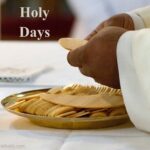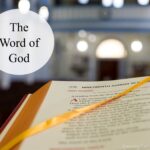
Substantially connected to Sacred Scripture, a homily is delivered by a bishop, priest, or deacon immediately after the reading of the Gospel during the Liturgy of the Word at a Catholic Mass.
Unlike a sermon, which begins with a theme and then looks to the Bible for support, a homily starts at the Bible readings at Mass and then expands on the Church’s teaching about faith, morality, or spirituality related to those verses.
In the place of Jesus, the homilist unpacks the Word of God for the faithful to receive in the framework of the Mass. A good homily is not necessarily entertaining and may even be challenging.
Homilies are not intended to be Bible studies or lessons on Church doctrine but should help Catholics better understand how God is involved in the world today and in current events.
While the homily is usually delivered from the pulpit or ambo, it may be presented from some other suitable place. It may also examine the prayers of the day, the order of the Mass, or the feast or saint that is being celebrated that day.
Catholics should attend Mass prepared to actively listen to the homily, reflect on it, and put it into practice in their daily lives.
Breaking open the Word of God:
For “everyone who calls on the name of the Lord will be saved.” But how can they call on Him in whom they have not believed? And how can they believe in Him of whom they have not heard? And how can they hear without someone to preach? And how can people preach unless they are sent? As it is written, “How beautiful are the feet of those who bring [the] Good News!” But not everyone has heeded the Good News; for Isaiah says, “Lord, who has believed what was heard from us?” Thus faith comes from what is heard, and what is heard comes through the Word of Christ.
Romans 10: 13-17
Applying the Bible to everyday life:
The Church’s teaching through the Gospel:
Good homilies require preparation:
Crystalizing the truth:
Given the importance of the word of God, the quality of homilies needs to be improved. The homily is “part of the liturgical action”, and is meant to foster a deeper understanding of the word of God, so that it can bear fruit in the lives of the faithful. Hence ordained ministers must “prepare the homily carefully, based on an adequate knowledge of Sacred Scripture”. Generic and abstract homilies should be avoided. In particular, I ask these ministers to preach in such a way that the homily closely relates the proclamation of the word of God to the sacramental celebration and the life of the community, so that the word of God truly becomes the Church’s vital nourishment and support.
Pope Benedict XVI, Sacramentum Caritatis, 22 February 2007
How the homily fits into the Mass:
“Therefore, the study of the sacred page should be the very soul of sacred theology. The ministry of the Word, too – pastoral preaching, catechetics and all forms of Christian instruction, among which the liturgical homily should hold pride of place – is healthily nourished and thrives in holiness through the Word of Scripture.”
Catechism of the Catholic Church 132
A form of communication:
Preparing to hear the homily:
The Truth, Goodness, and Beauty of the Catholic Church
Preaching Christ crucified:
Share this page with friends and family to start a conversation about your faith.
Don’t miss a post. Learn more about the Catholic Church and strengthen your Catholic faith.
Find more Fiercely Catholic video issues here.
Subscribe here.


